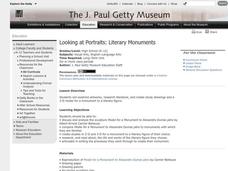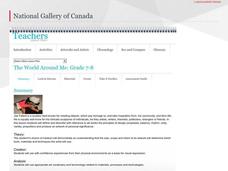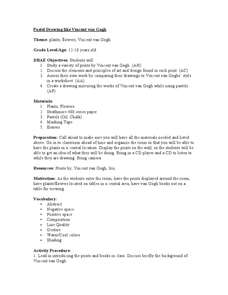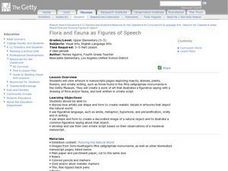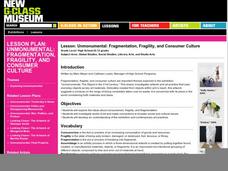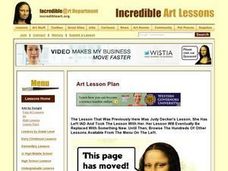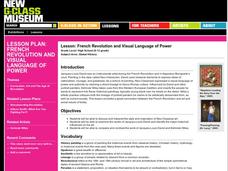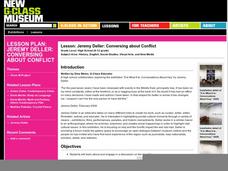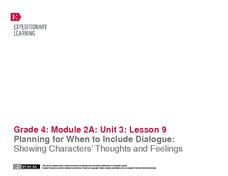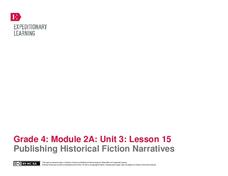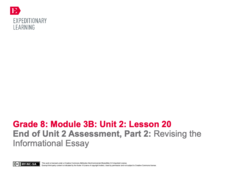Curated OER
Lesson: Urs Fischer: Controlling our Logic, Metaphors, and Semantics
Kids use poetry and contemporary art to start thinking about logic and personal expression. They read Sylvia Plath's poem "Metaphor," and critically examine the art of Urs Fischer. After working though a few logic problems they write...
Curated OER
Looking at Portraits: Literary Monuments
Examine artwork, research literature, and create art pieces for a monument to a literary figure. Young scholars analyze the sculpture Model for a Monument to Alexandre Dumas père and compare it to other well-known monuments. They...
National Gallery of Canada
Make a Parfleche
Examine American Indian art and culture by observing contemporary art and creating original pieces. Class members discuss artwork included in the plan and use these images to help inspire their own work, which should represent their...
National Gallery of Canada
The World Around Me
Have your learners use their surroundings as inspiration for an art project. Class members first examine and discuss art. They then choose an area and spend five days taking down observations in written and sketch form. These...
Curated OER
Pastel Drawing like Vincent Van Gogh
Learners discuss the elements of art and design found in a series of flower paintings by Vincent Van Gogh. They explore art, shading, and color as they create mirrored representations of the master's art, using oil pastel.
Curated OER
Flora and Fauna as Figures of Speech
What a lovely way to incorporate artwork into your language arts lesson. View artwork in illustrated manuscript pages, depicting insects, animals, plants, flowers, and ornate writing in the Getty Museum. Practice using figurative...
Curated OER
Lesson: Unmonumental: Fragmentation, Fragility, and Consumer Culture
Looking at art is the first step to analyzing it. And, if you can analyze art, you can analyze anything. Kids examine several pop art pieces that represent consumerism in modern culture. They discuss multiple facets of each piece and...
Curated OER
Project-Based Learning and the Arts
What's so great about Project-Based learning? Read to learn how projects can help kids apply higher-order thinking skills, conduct thoughtful investigations, and make cross curricular connections. This short article includes five...
Curated OER
Paper Maché Mancala Game Boards
Seventh graders create three dimensional works of art from two dimensional plans, develop skills in papier-mach?? technique, utilize elements and principles of design to create 3-D form, and develop math/strategy skills in playing the...
Curated OER
Triaxial Blends: Ceramics Lesson
To me, art implies color. Your class can learn all about triaxial blends, glazed colors, and ceramics. Included are the step-by-step instructions needed to teach learners how ceramic glazes developed, color blends, and how to measure and...
Curated OER
The Impact of Cultural Values in EArly Industrial England
Tenth graders analyze works from the period of the Industrial Revolution in England and identify the cultural values depicted and inferred that paved the way for the Industrial Revolution to occur at this time. They create captions that...
New Class Museum
Lesson: French Revolution and Visual Language of Power
Take a look at the French Revolution and neo-classic art, then compare it to current social issues and contemporary art. Kids analyze several pieces painted by Jacques-Louis David in regard to style and subject then compare them to...
Curated OER
Lesson: Jeremy Deller: Conversing about Conflict
Bridge cultural awareness, community, government, and art with an introspective and thought-provoking lesson. Upper graders become globally and socially aware as they analyze and explore the art of Jeremy Deller. They consider his images...
Curated OER
Lesson: Looking Closer: The Artwork of Shinique Smith
A critical discussion regarding the nature of Shinique Smith's second-hand clothing art is the foundation for the lesson. Critical thinkers fully analyze the meaning behind her work, taking close consideration of where the clothing came...
Curated OER
Mannerism (1520-1600)
Young artists are immersed into the tranformative world of Manneristic Art and Architecture during the Renaissance in this vivid presentation. Providing not only clear and concise charactertistics of Mannerism but examples of many...
Curated OER
Lesson: After Nature: Dystopia and Detournement
Werner Herzog's film, Lessons of Darkness is the topic of this lesson on art, politics, and culture. Learners discuss the concepts of utopia, dystopia, detournment, and Scorched Earth then compose a paper which describes dystopian reality.
Curated OER
Lesson: Double Album: The Collection and the Archive
An open discussion starts this lesson off. The class takes a critical look at five works of art that demonstrate the impact and purpose of identity through collections or archives. They then write a list or draw 10-15 items found in...
EngageNY
Grade 10 ELA Module 3: Unit 1, Lesson 13
Don't argue for the sake of argument. Scholars begin their work in lesson plan 13 and continue into lesson plan 14 as they analyze The Immortal Life of Henrietta Lacks. Working in groups, learners work toward collecting text evidence and...
Curated OER
Virtual Art Student: Sculpture
This is a big project, but lucky for you, the materials, steps, and additional notes are at-the-ready to make it a classroom possibility. Your class will sculpt a life-sized artist using steel brackets, plywood, chicken wire, and...
Curated OER
Lesson: David Goldblatt: Structures and Normativity, looking at Photography
Art can be a vehicle for social change and cultural expression. Upper graders examine the art of photographer David Goldblatt, as it pertains to apartheid, South Africa, and the AIDS epidemic. Discussion questions and image links are...
Orlando Shakes
The Taming of the Shrew: Study Guide
William Shakespeare's The Taming of the Shrew combines three things that are sure to capture scholars' attention: love, deception, and clown attire. With the curriculum guide, learners hone their opinion-writing skills and practice...
EngageNY
Planning for When to Include Dialogue: Showing Characters’ Thoughts and Feelings
Young writers examine dialogue conventions, including indentation, quotation marks, and expressing thoughts and feelings through a fictional text. By noticing where and when authors use dialogue, they decide how to incorporate dialogue...
EngageNY
Publishing Historical Fiction Narratives
Class members discover what it means to publish their works. Working on a computer, young writers use an online dictionary to edit their spellings and conventions based on the information added to the rubric. From here, and most of the...
EngageNY
End of Unit 2 Assessment, Part 2: Revising the Informational Essay
Writers look at the End of Unit 2 Assessment: Best First Draft of an Informational Essay handout and use sticky notes to identify things in their work that need editing and revising. They reference their notes to finalize their...
Other popular searches
- Aboriginal Art Worksheets
- Art History Worksheet
- Elements of Art Worksheets
- Renaissance Art Worksheets
- Middle Ages Art Worksheets
- Modern Art Worksheets
- Analyzing Works of Art
- Art Worksheets
- Social Studies Art Work
- Christmas Art Worksheets
- Works of Art
- Slavery Art Work



